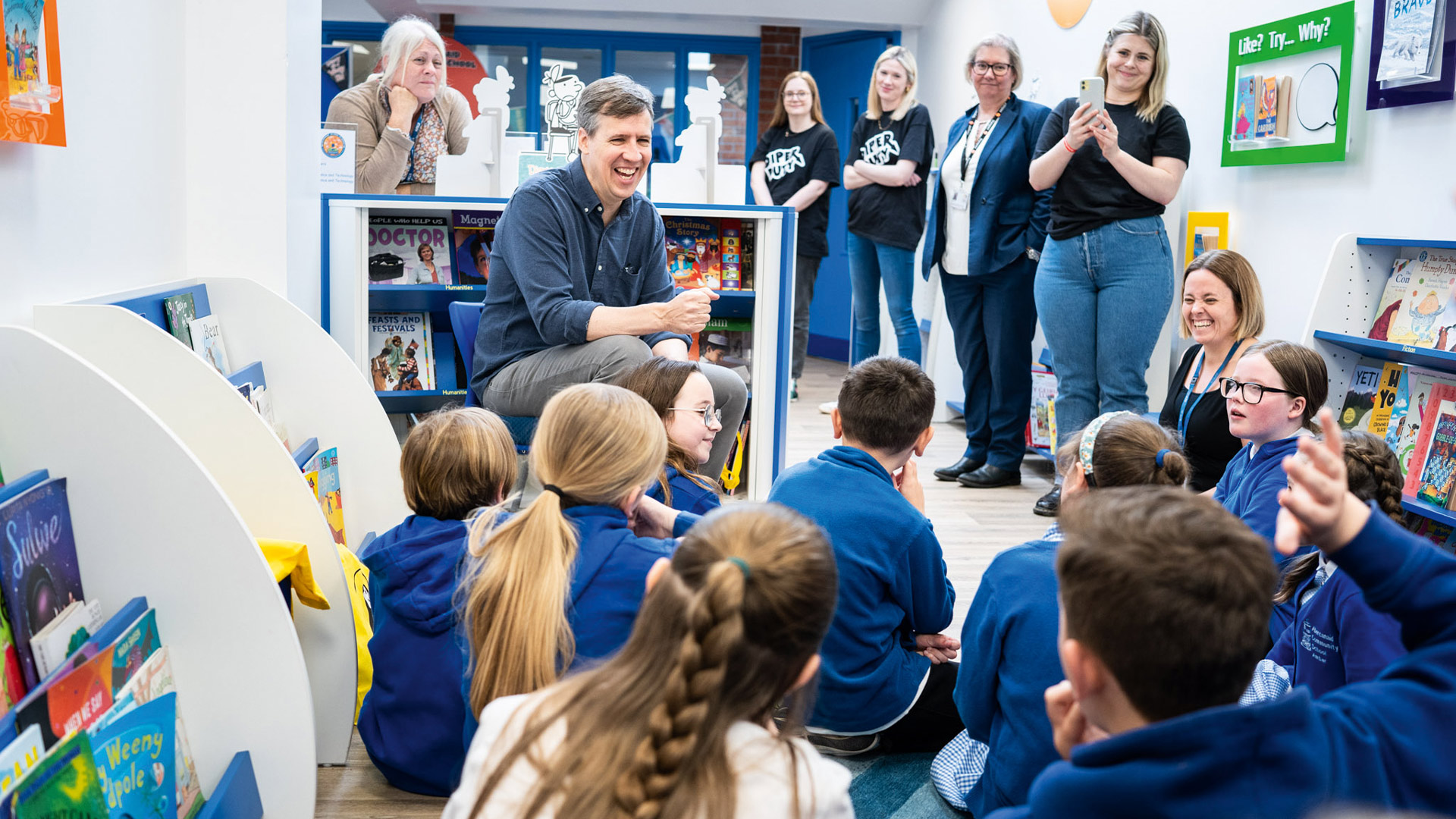National reading campaign chases target
The Libraries for Primaries campaign has recorded its 1,000th opening, with organisers targeting 2028 to reach the remaining 1,900 primary schools in Britain that have no library or dedicated reading space.
The programme—first piloted in 2018 as a partnership between the National Literacy Trust (NLT) and Penguin Random House (PRH) and officially rolled out in 2021—was launched to address the ongoing underfunding of the school libraries system. The statistics around this remain stark: one in seven state primary schools across the UK have no library space—which translates to about 750,000 children—a figure that skyrockets to one in four in more disadvantaged areas. There is a cruel postcode lottery at play: while one in 20 primaries in South East England do not have a library, that rises to one in five in North East England.
About 40% of schools have no budget for a library partially because they are not required to do so by the government. (Prisons must have libraries; an unquestionably essential service—that schools do not have the same provision seems misguided to say the least.) As a consequence, and particularly since the pandemic, library spend has become a softer target for under-pressure school administrators forced to cut budgets somewhere.
Francesca Dow, PRH Children’s managing director, says: “We got involved originally as it goes back to our mission, which is to publish books for everyone because a book can change anyone. What we’re looking for in our social-impact work is a way to bring together our commercial and our ‘missionary’ values. It felt to us that making a difference at the beginning stages of the reading journey with kids was how we could most powerfully impact the reading culture of the country. So, if we could help put the right book in a person’s hands and create the right environment for them, then they can get excited about reading.”
Roll-out logistics
Institutions that sign up to Libraries for Primaries must commit to having at least one educator trained to roll out the scheme within their school, which will include setting up a dedicated reading-for-pleasure space (if no actual library is available) and instructing other members of staff and student librarians. Each participating school will receive 500 new books—400 from PRH and 100 from a number of independent publishers including Scallywag, b small, Sweet Cherry and Knights Of. Plus, there are some additional perks such as library resources, marketing materials and funded visits from authors.
The indies were brought in a couple of years ago to ensure that each school’s bespoke range could be representative of the student body’s in terms of age group, subject matter and author selection. Or as Dow explains: “[The range] can’t just be the Jeff Kinneys [author of the Diary of a Wimpy Kid series]— we have to think about different reading levels and abilities.” That said, the Wimpy Kid star has wholeheartedly done his bit, two weeks ago visiting the Libraries for Primaries space at Abercanaid Community School in rural South East Wales prior to an appearance at the Hay Festival. Dow adds: “We have tweaked the formula [since the start] somewhat but it’s essentially the books, the training, good materials and resources. What has been proven is that when you give kids the opportunity to choose their own books it can be completely transformative for the appetite and excitement around books.”
PRH chief brand and communications officer Rebecca Sinclair echoes Dow’s point that the agency of staff and students has made the scheme work. She adds: “One of the things that makes it distinctive is part of the training is how to instil a culture of reading in the school. So it becomes bigger than just the library space itself—it’s how to kind of embody it across the whole school.”
Supporting the scheme
Since the Libraries for Primaries launch, more than 30 partners and funders have joined in, including Arts Council England and entities who, like PRH, come from the books world and thus have obvious skin in the game, such as Oxford University Press, the Marcus Rashford Book Club and the Foyle Foundation (in April, the trust set up by the late Foyles bookshop co-owner Christina Foyle donated £1.8m to the scheme). Some less obvious partners include the Chase banking group, Bloomberg and Burberry. Meanwhile, the NLT patron Queen Camilla has provided some royal stardust; she most recently opened the 1,000th library at Moreland Primary School in north London with the current (Joseph Coelho) and a past (Cressida Cowell) Waterstones Children’s Laureate.
Therefore, in many ways Libraries for Primaries is a sterling example of a public, private and charitable coalition. Of course, in an ideal world the project would not need to exist, as schools across the land would have fully government-funded libraries and librarians. Sinclair says: “With the NLT we have been talking to all political parties about [Libraries for Primaries] and what the model does—and we’ve had positive reactions. But what I would say to any incoming government is that we would really hope to see increased investment in libraries, both in the primary-school space and in the public space.”
The Labour manifesto launch will come after this writing, but judging by the party’s announced policies during the March local elections the expected next government does not seem to have primary-school librarieshigh on its agenda. Though the party has spoken of boosting literacy levels and increasing mental health support for students; perhaps the penny will drop that fully funded school libraries and a focus on reading for pleasure can help with that.
Libraries for Primaries is forging ahead, with Dow and Sinclair confident it will reach those other 1,900 schools in the 2028 time frame. Though if and when that target is hit both note that it will not quite give a sense of job done, as then there is sustainability—book ranges to freshen, new teachers to train—to consider as the project matures.
Dow adds: “I think we’ll get [to the target] because—and I don’t want to undermine what we are doing—in many ways the offering is simple. Schools want to get involved, we have a now tried-and-tested formula. It’s not boilerplate but it’s kind of a brilliant package: books that we can deliver, teachers we know how to train, materials we know work. And if you get that powerful engagement in the schools, it really comes to life."











